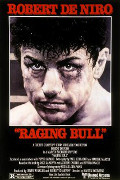
Directed by
Martin Scorsese
128 minutes
Rated MA
Reviewed by
Bernard Hemingway


Raging Bull
Despite the crudity of the subject matter, Raging Bull is one of Scorsese's best films, a biopic about real-life middleweight boxer Jake LaMotta, Michael Chapman's excellent black and white photography gives the film a B-grade look appropriate to the 1940s to '50s period in which the film is set and the fight sequences are brilliantly executed (longtime Scorsese collaborator, editor Thelma Schoonmaker.deservedly won an Oscar) whilst Robert de Niro gives a stand-out performance (and also won an Oscar). When combined with Paul Schrader's script (with contributions by Mardik Martin, La Motta as original author and consultant an, although uncredited, De Niro), and Scorsese’s deftly-judged direction (the same three-way collaboration that yielded Taxi Driver) the outcome makes for a convincing embodiment of the world from which those fictions are derived.
De Niro has played more than his fair share of fictional Brooklyn thugs and in hindsight at least Raging Bull could well be a test run for Goodfellas (1990) and Casino (1995) particularly thanks to the contributions of Joe Pesci as LaMotta's brother. It is only in the second half that Scorsese steps away from gangster movie generics, stylishly done as they are, and De Niro really gets a chance to act. In her screen debut the Kim Novakish beauty Cathy Moriarty, who was only 17 when the film began production gives a remarkable performance as Vickie, the madonna-whore of LaMotta’s tortured imagination (once again she is a pre-echo of Sharon Tate's Ginger in Casino).
FYI: Ms. Moriarty was seen the following year as Dan Ackroyd's wife, Ramona, in the comedy Neighbours but a near fatal car accident interrupted her career for most of the '80s and she never returned to the big time.
Want something different?





